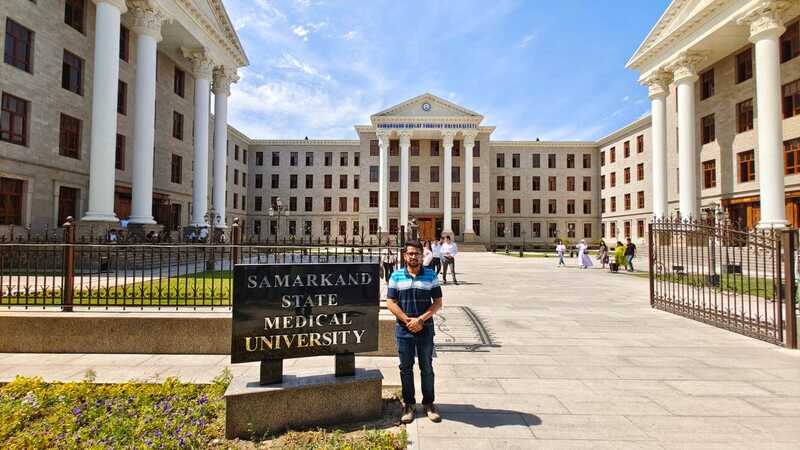Samarkand State Medical University (SSMU), located in the historic city of Samarkand, is at the forefront of transforming healthcare education in Uzbekistan and beyond. The university’s commitment to innovation, research, and modern educational methods is making it a hub for training future healthcare professionals. Here are some of the key aspects contributing to this transformation:
1. Modernized Curriculum
Samarkand State Medical University has embraced a modern curriculum that integrates traditional medical education with contemporary approaches in science, technology, and clinical practice. By focusing on problem-based learning, case studies, and practical application, students are better equipped to address real-world medical challenges.
2. State-of-the-Art Facilities
The university has invested in state-of-the-art medical training facilities, including simulation labs, advanced medical equipment, and digital classrooms. These resources allow students to gain hands-on experience in a controlled environment, enhancing their clinical skills before they enter real-world settings.
3. Research and Innovation Hub
SSMU fosters a culture of research and innovation, encouraging students and faculty to engage in scientific inquiry and medical research. The university collaborates with global research institutions and healthcare organizations to stay at the cutting edge of medical advancements, particularly in areas such as genetics, biotechnology, and public health.
4. International Collaboration and Exchange Programs
Samarkand State Medical University has formed partnerships with universities and medical institutions worldwide. These collaborations enable student and faculty exchange programs, joint research initiatives, and shared knowledge on global health challenges. The international exposure prepares students to work in diverse healthcare environments and address issues on a global scale.
5. Focus on Digital Health
Recognizing the importance of digital health technologies, SSMU integrates telemedicine, digital health records, and health informatics into its curriculum. This emphasis ensures that graduates are proficient in the digital tools that are increasingly becoming a part of modern healthcare systems.
6. Holistic Education and Soft Skills
In addition to medical knowledge, SSMU emphasizes the development of soft skills such as communication, empathy, and teamwork. This holistic approach to education prepares healthcare professionals who are not only technically competent but also compassionate and effective in patient care.
7. Public Health and Community Engagement
SSMU prioritizes public health education, ensuring that students understand the importance of preventive healthcare and community engagement. Through community outreach programs and public health campaigns, students are encouraged to contribute to improving healthcare access and outcomes in underserved populations.
8. Postgraduate Training and Specialization
The university offers a wide range of postgraduate programs and specializations, allowing graduates to pursue advanced training in various medical fields. This commitment to lifelong learning ensures that healthcare professionals can continue to develop their expertise and stay up-to-date with medical advancements.
Conclusion
Samarkand State Medical University and Siberian State Medical University is transforming healthcare education by blending traditional medical training with modern innovations, research, and a global perspective. Its focus on technology, hands-on experience, and holistic learning is producing well-rounded healthcare professionals equipped to meet the challenges of modern medicine. As the university continues to evolve, it is poised to play a key role in shaping the future of healthcare in the region and internationally.
FAQs
1. What makes Samarkand State Medical University’s healthcare education unique?
SSMU offers a blend of traditional medical education with modern innovations, such as problem-based learning, digital health technologies, and cutting-edge research. The curriculum emphasizes hands-on experience, soft skills development, and international collaboration.
2. What type of curriculum does SSMU use?
The university uses a modern, integrated curriculum that combines theoretical learning with practical applications. This includes clinical rotations, simulation-based training, and exposure to digital healthcare tools like telemedicine and electronic health records.
3. Are there any opportunities for international collaboration?
Yes, SSMU has partnerships with international medical schools and healthcare institutions, allowing for student and faculty exchange programs, joint research, and global healthcare projects.
4. What facilities and resources are available to students?
The university provides state-of-the-art facilities, including simulation labs, advanced medical equipment, digital classrooms, and research labs. These facilities ensure students gain practical, hands-on experience in a simulated healthcare environment.
5. Does SSMU offer research opportunities?
Yes, SSMU fosters a strong research culture, encouraging students and faculty to engage in medical research. The university collaborates with global institutions in areas such as genetics, biotechnology, and public health.
6. What postgraduate programs are available?
SSMU offers a range of postgraduate training and specializations in various medical fields, enabling graduates to pursue advanced education and continuous professional development.
7. How does SSMU integrate digital health into its education?
Digital health technologies, such as telemedicine, health informatics, and electronic health records, are incorporated into the curriculum. This ensures that students are proficient in using digital tools that are critical in modern healthcare.
8. What soft skills are emphasized in the training?
SSMU focuses on the development of communication, empathy, teamwork, and leadership skills, ensuring that students are well-rounded healthcare professionals who can deliver compassionate and effective patient care.
9. Is there a focus on public health at SSMU?
Yes, public health and preventive medicine are core components of the curriculum. Students participate in community engagement and public health campaigns to improve healthcare access and outcomes in underserved populations.
10. What career opportunities do graduates of SSMU have?
Graduates of SSMU are well-prepared to work in diverse healthcare environments, both in Uzbekistan and internationally. They are trained to pursue careers in clinical practice, research, public health, and healthcare management, with many opportunities for specialization and leadership roles.
11. How does SSMU prepare students for the global healthcare landscape?
Through international partnerships, digital health integration, and a focus on global health issues, SSMU ensures that its graduates are prepared to work in diverse healthcare settings and address global medical challenges.
12. How can prospective students apply to SSMU?
Prospective students can apply through the university’s official website or admission offices. They need to meet the specific academic requirements, and international students may need to fulfill language proficiency criteria.

